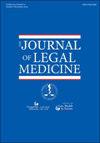加州死亡证明程序:建议改进
IF 0.3
4区 医学
Q3 LAW
引用次数: 0
摘要
Robert A. Bitonte, MD, MA, JD, LLM, FCLM,洛杉矶市残疾委员会,洛杉矶,CA;电邮rbitonte@aol.com Michelle Gutierrez Harris, MHS, San Diego, CA;电子邮件michelleann.gutierrez@gmail.com在过去几年中,与阿片类药物有关的死亡人数引起了人们的极大兴趣。在加州,这导致了CURES(加州受控物质利用审查和评估系统)数据库的实施和强制使用。遏制阿片类药物滥用的愿望导致最近启动了加州死亡证明计划。该程序识别在被确定因阿片类药物过量而死亡的人3年内为其开过阿片类药物的医生、牙医和其他提供者。然后将确定的开处方者提交给该开处方者的监督管理委员会,如加州医学委员会或加州牙科委员会,以进行进一步调查和可能的纪律处分。任何转介到监管委员会都需要进行调查。这些调查往往是昂贵的,分散注意力的,令人尴尬的,并可能损害专业人士的声誉和实践。我们建议在这些确定的处方者被提交给各自的监管委员会进行调查之前有一个中间过程。例如,受牵连的专业人员可被转介到其县医学协会,由其专业同行进行审查。如果确定发生了可疑或不道德的行为,那么这些专业人员可以被转介到各自的监管机构进行调查。《美国法医学杂志》2020年第40卷第1期。S1, 1 https://doi.org/10.1080/01947648.2020.1715717本文章由计算机程序翻译,如有差异,请以英文原文为准。
California Death Certificate Program: A Suggested Improvement
California Death Certificate Program: A Suggested Improvement Robert A. Bitonte, MD, MA, JD, LLM, FCLM, City of Los Angeles Commission on Disability, Los Angeles, CA; Email rbitonte@aol.com Michelle Gutierrez Harris, MHS, San Diego, CA; Email michelleann.gutierrez@gmail.com Over the past several years much interest has been aroused by the number of opioid related deaths. In California this has led to the implementation and enforced usage of the CURES (California Controlled Substance Utilization Review and Evaluation System) database. The desire to curb opioid abuse has led to a recent initiation of the California Death Certificate Program. This program identifies physicians, dentists, and other providers who have prescribed opiates to an individual within 3 years of that person being identified as having died due to an opioid related overdose. The identified prescriber is then referred to that prescriber’s overseeing regulatory board, such a Medical Board of California or the Dental Board of California, for further investigation and possible disciplinary action. Any referral to a regulatory board necessitates an investigation. These investigations often are expensive, distracting, embarrassing, and potentially harmful to a professional’s reputation and practice. We propose that there be an intermediary process before these identified prescribers are referred to their respective regulatory boards for investigations. For example, implicated professional individuals could be referred to their County Medical Associations for review by their professional peers. If questionable, or unethical, behavior is determined to have occurred, then these professional individuals can then be referred to their respective regulatory bodies for investigation. 2020 American College of Legal Medicine JOURNAL OF LEGAL MEDICINE 2020, VOL. 40, NO. S1, 1 https://doi.org/10.1080/01947648.2020.1715717
求助全文
通过发布文献求助,成功后即可免费获取论文全文。
去求助
来源期刊

Journal of Legal Medicine
Multiple-
CiteScore
1.10
自引率
0.00%
发文量
3
期刊介绍:
The Journal of Legal Medicine is the official quarterly publication of the American College of Legal Medicine (ACLM). Incorporated in 1960, the ACLM has among its objectives the fostering and encouragement of research and study in the field of legal medicine. The Journal of Legal Medicine is internationally circulated and includes articles and commentaries on topics of interest in legal medicine, health law and policy, professional liability, hospital law, food and drug law, medical legal research and education, the history of legal medicine, and a broad range of other related topics. Book review essays, featuring leading contributions to the field, are included in each issue.
 求助内容:
求助内容: 应助结果提醒方式:
应助结果提醒方式:


